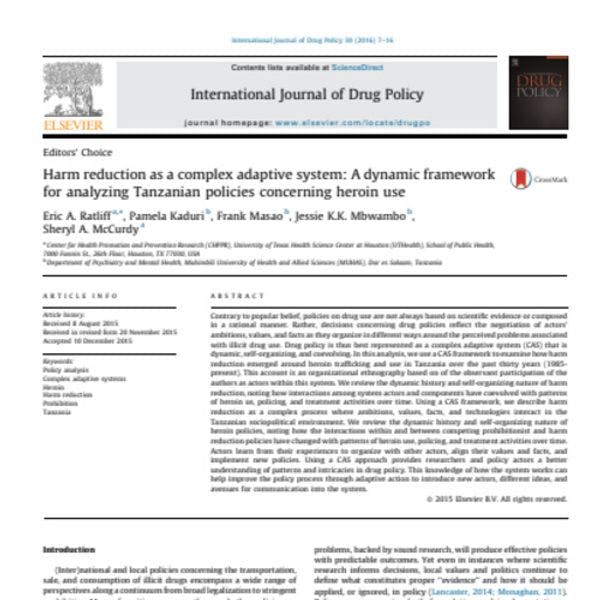Harm reduction as a complex adaptive system: A dynamic framework for analyzing Tanzanian policies concerning heroin use
(Inter)national and local policies concerning the transportation, sale, and consumption of illicit drugs encompass a wide range of perspectives along a continuum from broad legalization to stringent prohibition. Many of us citizens assume these and other policies are composed and implemented in a rational, purposeful manner by a select group of government officials after careful consideration of all the available facts. This rational/technical model is the basis for the ‘‘evidence-based’’ turn in drug policy where some actors attempt to eliminate local values and political motives from the decisionmaking process, believing that sufficient knowledge of social problems, backed by sound research, will produce effective policies with predictable outcomes. Yet even in instances where scientific research informs decisions, local values and politics continue to define what constitutes proper ‘‘evidence’’ and how it should be applied, or ignored, in policy (Lancaster, 2014; Monaghan, 2011). Policy – encompassing both formulation and implementation – remains an unpredictable enterprise. The increasing democratization of policy engenders greater uncertainty, with more actors bringing their varied values, goals, and evidence to the process. How can we researchers and stakeholders better understand the complex environment in which policy occurs? How can we apply such knowledge to reduce uncertainty and improve the policy process? What is needed is an approach that accounts for the broad range of policy actors, structures, ideas, and technologies as they interact over time to enact policy within a continuously changing sociopolitical context.
Keep up-to-date with drug policy developments by subscribing to the IDPC Monthly Alert.
Downloads
Regions
Related Profiles
- International Journal of Drug Policy
